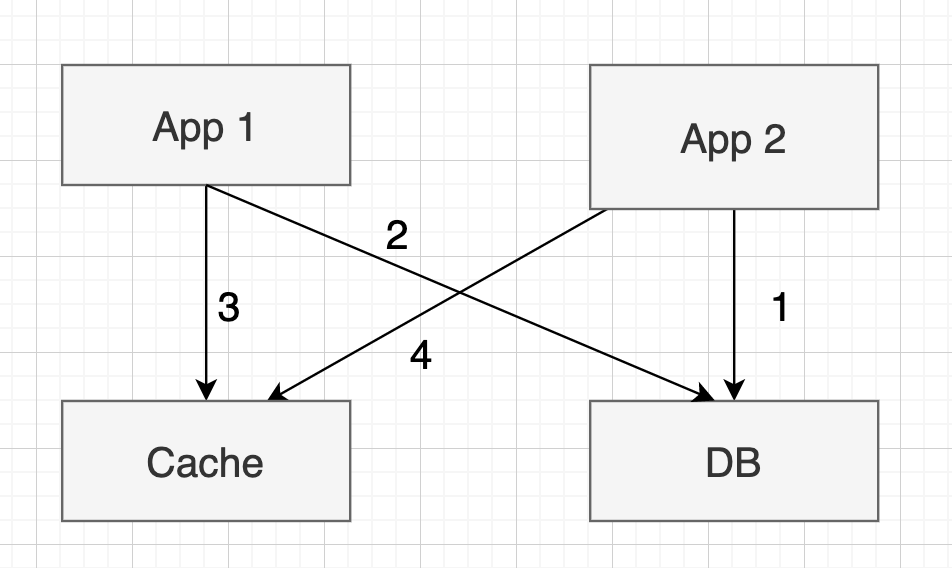Invalidate Cache(淘汰缓存)VS Update Cache(更新缓存)
缓存更新时,Invalidate Cache VS Update Cache
Invalidate Cache
-
Pros
- 简单
-
Cons
-
更差的 performance,比如有super hot key时,这个缺点会更加突出
-
可能会导致 cache avalenche,从而导致 DB 或者对应的data source挂掉。
-
仍然可能出现读到stale data,比如
-
Case 1 - Due to the nature of async, small period of time where data is stale.
DB: (x=1) => (x=2)
- App writes to database (x=2)
- App reads old data from cache (x=1)
- Cache gets invalidated (x=nil)
-
Case 2 - Update db and invalidate cache are not atomic
DB: (x=1) => (x=2)-
App2 reads from database (x=1)
-
App1 writes database (x=2)
-
Cache gets invalidated (x=nil)
-
App2 writes old data to cache (x=1)

-
-
-
Update Cache
- Pros
- 更好的 performance,比如有super hot key
- Cons
- 并发写时, Update Cache 更可能出现数据不一致
- 通过分区,保证在Update Cache时对于同一个key的 cache update的serializability,e.g.,
- Distributed Lock rescues, but sacrifices performance/avalability
- 将update cache的操作produce一个消息到MQ,并单独运行一个app用于处理cache update(同时保证同一个key的 cache update的serializability)
- i.e., trade-off between system complexity and the tolerance of inconsistency
- 通过分区,保证在Update Cache时对于同一个key的 cache update的serializability,e.g.,
- 并发写时, Update Cache 更可能出现数据不一致
Summary
那到底是选择更新缓存还是淘汰缓存呢,主要取决于“更新缓存的复杂度”。
例如,上述场景,只是简单的把余额money设置成一个值,那么:
- 淘汰缓存的操作为
deleteCache(uid) - 更新缓存的操作为
setCache(uid, money)
具体来说
- 如果更新缓存的代价很小,此时我们应该更倾向于更新缓存,以保证更高的缓存命中率。
- 如果更新缓存的代价很高(比如余额是通过很复杂的数据计算得出来的,例如业务上除了账户表account,还有商品表product,折扣表discount),则更倾向于删除缓存。
比如:
account(uid, money)
product(pid, type, price, pinfo)
discount(type, zhekou)
业务场景是用户买了一个商品product,这个商品的价格是price,这个商品从属于type类商品,type类商品在做促销活动要打折扣,购买了商品过后,这个余额的计算就复杂了,需要:
- 先把商品的品类,价格取出来:
SELECT type, price FROM product WHERE pid=XXX - 再把这个品类的折扣取出来:
SELECT zhekou FROM discount WHERE type=XXX - 再把原有余额从缓存中查询出来
money = getCache(uid) - 再把新的余额写入到缓存中去
setCache(uid, money-price*zhekou)
更新缓存的代价很大,此时我们应该更倾向于淘汰缓存。
Reference
- https://mp.weixin.qq.com/s?__biz=MjM5ODYxMDA5OQ==&mid=404087915&idx=1&sn=075664193f334874a3fc87fd4f712ebc&scene=21#wechat_redirect
- https://mp.weixin.qq.com/s?__biz=MjM5ODYxMDA5OQ==&mid=404202261&idx=1&sn=1b8254ba5013952923bdc21e0579108e&scene=21